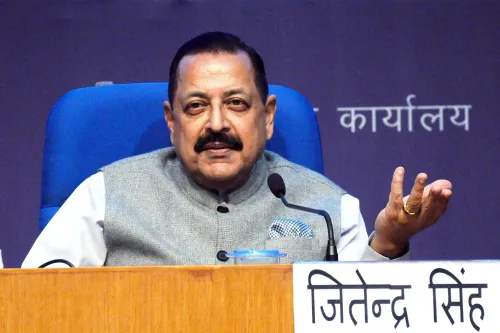Is Fighting Corruption a Moral Responsibility for Every Citizen? Odisha CM

Synopsis
Key Takeaways
- Fighting corruption is a moral duty for all citizens.
- The state has adopted a zero-tolerance policy against corruption.
- Transparency and integrity are key to effective governance.
- The Vigilance Department is empowered to act independently.
- Public support is essential for a corruption-free Odisha.
Bhubaneswar, Oct 28 (NationPress) The Chief Minister of Odisha, Mohan Charan Majhi, emphasized on Tuesday that combating corruption transcends mere administrative obligations, becoming a moral duty for every citizen within the state.
Speaking at a significant gathering during the state-level event for Vigilance Awareness Week 2025 in Bhubaneswar, CM Majhi remarked: "When corruption infiltrates our systems, it undermines the trust of the common people. Corruption erodes the very bedrock of governance. Hence, the fight against corruption is not simply a duty, but a profound moral obligation for all of us."
Identifying corruption as a major barrier to societal progress and development, the Chief Minister noted that the state government has implemented a zero-tolerance policy towards corruption to guarantee that the advantages of welfare initiatives are delivered to the legitimate beneficiaries in a fair and transparent manner.
He articulated the necessity for a clean, transparent, and accountable administrative framework, asserting that only through honest governance can public trust be fortified and development expedited. "Transparency and integrity in governance are vital for cultivating a forward-thinking and corruption-free society," he stated.
Praising the efforts of the Odisha Vigilance Department, CM Majhi stated, "Upon assuming office, I issued explicit directives to enforce strict measures against corruption. The Odisha Vigilance Department has gained recognition as one of the premier anti-corruption agencies in the nation, known for its decisive actions against corrupt individuals, irrespective of their stature, by reforming the former system."
He elaborated that the government has empowered the Vigilance Department to operate independently and without fear, ensuring that no one involved in corrupt practices escapes accountability. "No one is exempt—whether they are Class IV employees or IAS officers—and this has been made possible due to the autonomy provided to the department," asserted CM Majhi.
Reaffirming his administration's commitment, the Chief Minister declared that the Vigilance Department will not pardon or overlook anyone engaged in corruption, regardless of their rank or influence.
Highlighting the state's vigorous campaign against corrupt practices, CM Majhi revealed that 30 government employees convicted in corruption cases have been dismissed, while pensions of 68 officials found guilty have been suspended.
The Chief Minister called upon citizens to actively engage in supporting the government's anti-corruption efforts and to uphold integrity in both public and private spheres. "A corruption-free Odisha is achievable only when every citizen plays a role in fostering a just, ethical, and accountable system," he concluded.









